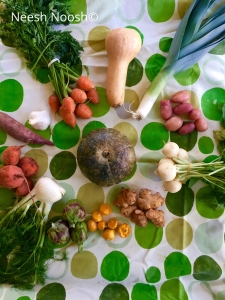Bereshit (Genesis) is fraught with familial fighting and divisions. Vayechi, the final parsha (Torah portion) in Bereshit, ends this strife as it is a story of unity and redemption of the 12 tribes of Israel before they begin their exile. Diane Bloomfield teaches that their patriarch Jacob, embodies the quality of emet (truth), even in Egypt, a world of constriction and exile. Jacob’s 17 years of living in Egypt prepared the Israelites for their exile: he passed the seeds of discernment to them to discover and reveal his world of emet and echad (oneness).
In Vayechi, Jacob gathers his 12 sons to his deathbed, and says “come together that I may tell you what is to befall you in days to come.” Chana Kroll writes on Chabad.org that at this moment, “the twelve individuals became one unified soul. They said the Shema prayer before their father Jacob, thus reassuring him that the principles of serving G‑d and recognizing His absolute Oneness would be lived and taught by them as well. One family, with one heart and one soul.”
The diverse, but unified sons, are now ready for their journey from Egypt. Chana Kroll continues, “G‑d’s Oneness is actually expressed by the very existence of such diversity within Creation. Our oneness as a people is meant to reflect this.”
In all aspects of our lives we can find diversity that unites us. As I’ve written previously, biodiversity, “is nature, it is life itself and it is the diversity of life.” Our survival depends on growing and eating a diversity of foods to protect God’s Creation, of which we are all stewards.
Preserving seeds in the face of industrial agriculture’s mono-cropping and extreme weathers due to climate change, preserves historical, indigenous and culturally important foods, protects farmland and farmers and strengthens food systems through hyper-local diversity. This is an opportunity for us to gather together as protectors of diversity in farming in the face of constriction in industrial agriculture.
The dish I created for Vayechi is representative of Jacob uniting his 12 sons at his deathbed. There are 12 different vegetables for each son that surround a cave-like Kabocha squash representative of Jacob’s burial. There are 17 ingredients total in the dish, representing the 17 years that Jacob lived in Egypt. Pomegranate seeds–a symbol of fertility–are sprinkled inside the Kabocha squash. The multitude of colors and scents in the dish is symbolic of the diversity of the family and their strength in unity. And, the plethora of ingredients highlights the biodiversity of our foods.
Vayechi Unified Vegetables Roast
Because there are many ingredients, I only used a few items of each. Also, note that their cooking times will vary due to size.
1 Kabocha squash
3 small artichokes, tough outer leaves removed
6 miniature zucchini
4-6 sunchokes (Jerusalem artichokes), roughly chopped
5-7 Thumbelina carrots
1 fennel bulb, thickly sliced
4 yellow beets
1 leek, sliced
8 Fingerling potatoes
6 turnips, roughly chopped
1 Butternut squash
1 purple yam, sliced into chunks
6 garlic cloves, in skin
Olive oil
salt and pepper
1 tsp chopped rosemary
1 tbsp pomegranate seeds
Preparation
1. Pre-heat oven to broil. Line pans with parchment paper and wash vegetables.
2. Steam artichoke for a few minutes to soften leaves.
3. Pierce Kabocha squash and Butternut squash for ventilation and rub olive oil on outside flesh. Place on tray.
4. Wrap beets in tinfoil. Chop larger vegetables and put on parchment paper lined trays. Drizzle all vegetables with a few tablespoons of olive oil. Put chopped rosemary on top of potatoes.
5. Roast vegetables. Times will vary depending on the vegetables so you will have to check and remove them as they are ready. The Kabocha and Butternut squashes will take approximately 45 minutes. Remove from oven when vegetables are crisp and browned and can be pierced with a fork. Remove skin from garlic and beets when cool to touch.
6. Once cool, cut top off of Kabocha squash and scoop out seeds (try toasting them later-they’re delicious!). Sprinkle pomegranate seeds inside.
7. Slice Butternut squash and remove seeds.
6. Place Kabocha squash in center of platter surrounding by 12 vegetables. Drizzle all vegetables with fruity olive oil and salt and pepper to taste.
B’tayavon!







This dish looks amazing…
LikeLiked by 1 person
Thanks-I hope you get a chance to make it too!
LikeLike